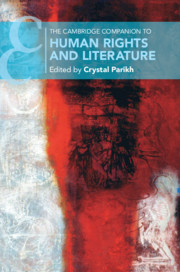Book contents
- The Cambridge Companion to Human Rights and Literature
- The Cambridge Companion to Human Rights and Literature
- Copyright page
- Epigraph
- Contents
- Notes on Contributors
- Chronology of Major Works and Events, 1215–2018
- Introduction
- Part I Genealogies and Contexts
- Part II Fashioning Methods
- Part III Generic Representations
- 9 Narrating the Human Person
- 10 The Dramas of Human Rights
- 11 Poetic Justice and the Idea of Poetic Redress
- 12 Truth-Telling
- 13 Visualizing the World
- Part IV Writing Human Rights
- Select Bibliography
- Index
- Cambridge Companions To …
10 - The Dramas of Human Rights
Documentary Theater and Performance
from Part III - Generic Representations
Published online by Cambridge University Press: 24 June 2019
- The Cambridge Companion to Human Rights and Literature
- The Cambridge Companion to Human Rights and Literature
- Copyright page
- Epigraph
- Contents
- Notes on Contributors
- Chronology of Major Works and Events, 1215–2018
- Introduction
- Part I Genealogies and Contexts
- Part II Fashioning Methods
- Part III Generic Representations
- 9 Narrating the Human Person
- 10 The Dramas of Human Rights
- 11 Poetic Justice and the Idea of Poetic Redress
- 12 Truth-Telling
- 13 Visualizing the World
- Part IV Writing Human Rights
- Select Bibliography
- Index
- Cambridge Companions To …
Summary
This chapter considers the particular significance of theater as a genre that works at the intersection of imagination, spectacularity, and embodiment for the representation of human rights, as well as drama as a critical lens for understanding the “performance” of human rights in other public venues. Live drama can carry with it the aspects of temporal urgency, public activity, and personal embodiment on which human rights have also been centered, and documentary theater in particular holds significance in human rights discourse due to its relationship to archive, evidence, and the real. Examining three forms of documentary theater (the tribunal, the auto-biographical, and the site-specific), the chapter argues that this genre has become an essential mode for framing human rights both in its advocatory potential and in its posing of questions about the relationship of theater and documentary to truth and legitimacy.
- Type
- Chapter
- Information
- The Cambridge Companion to Human Rights and Literature , pp. 141 - 153Publisher: Cambridge University PressPrint publication year: 2019

